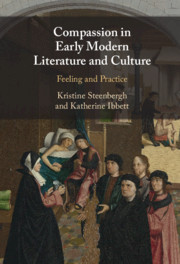Book contents
- Compassion in Early Modern Literature and Culture
- Compassion in Early Modern Literature and Culture
- Copyright page
- Contents
- Acknowledgements
- Contributors
- Introduction
- Part I Theorising
- Part II Consoling
- Part III Exhorting
- Part IV Performing
- Part V Responding
- Chapter 9 Mountainish Inhumanity in Illyria
- Chapter 10 Standing on a Beach
- Part VI Giving
- Part VII Racialising
- Part VIII Contemporary Compassions
- Index
Chapter 9 - Mountainish Inhumanity in Illyria
Compassion in Twelfth Night as Social Luxury and Political Duty
from Part V - Responding
Published online by Cambridge University Press: 23 April 2021
- Compassion in Early Modern Literature and Culture
- Compassion in Early Modern Literature and Culture
- Copyright page
- Contents
- Acknowledgements
- Contributors
- Introduction
- Part I Theorising
- Part II Consoling
- Part III Exhorting
- Part IV Performing
- Part V Responding
- Chapter 9 Mountainish Inhumanity in Illyria
- Chapter 10 Standing on a Beach
- Part VI Giving
- Part VII Racialising
- Part VIII Contemporary Compassions
- Index
Summary
The question of the treatment of the Steward Malvolio is one of the crucial interpretive issues in Twelfth Night, and the placement of audience compassion is central to the history of that debate. Recent readings focusing on the social function of laughter have reached diverging conclusions. Is Malvolio the legitimate victim of a ‘community of laughers’, or does laughter fail to achieve social correction and cohesion in the play? Elisabetta Tarantino argues that the play’s audience is expected to achieve a higher understanding of the motives why compassion may be granted or withheld by different groups of characters within the play. Reading the play in its international political context, she argues that the ambivalent representation of Malvolio is a central part of the play’s semantic strategy. On the basis of new intertextual evidence, she suggests that Twelfth Night addresses issues of community and compassion in a direct historical and political sense, with reference to the contemporary relationship between England and Europe.
Keywords
- Type
- Chapter
- Information
- Compassion in Early Modern Literature and CultureFeeling and Practice, pp. 179 - 196Publisher: Cambridge University PressPrint publication year: 2021

